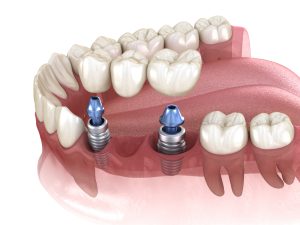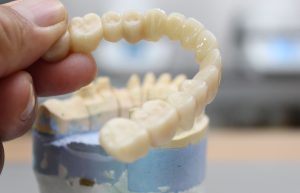Discover Comprehensive Tooth Replacement Solutions at Ambis Dental
When it comes to restoring your smile, implant-supported bridges offer a revolutionary approach to replace missing teeth. At Ambis Dental in Ithaca, we prioritize your oral health, ensuring you receive the highest quality care every step of the way. Our focus is to optimize your dental experience with effective strategies that support both function and aesthetics.
If you think this could be the right solution for your dental needs, don’t hesitate to reach out. Call our Ithaca implant dentist at (607) 272-1874 for a consultation to discuss your options.
What Are Implant-Supported Bridges?
Implant-supported bridges are dental restorations that utilize dental implants to hold and support a fixed bridge of prosthetic teeth. This method effectively replaces one or several missing teeth, providing a durable and supportive solution anchored directly to your jawbone.

A standard dental implant bridge consists of four main components:
- Titanium Posts: These posts are surgically inserted into the jawbone and serve as artificial tooth roots. They stimulate the jawbone, which helps maintain its density and structure.
- Abutments: These are small connectors placed on top of the implants, which hold the dental crowns that mimic natural teeth.
- Porcelain Dental Crowns: Customized crowns are placed on the abutments, offering a natural appearance and restoring functionality.
- Pontic Teeth: These are the prosthetic teeth that bridge the gap where natural teeth are missing.
If you want to learn more about how we can restore your smile with implant-supported bridges, call us at (607) 272-1874 to schedule an appointment today.
Types of Implant-Supported Bridges
There are several types of implant-supported bridges, each designed to meet unique patient needs:
- Fixed Implant-Supported Bridge: This type of bridge is permanently attached to the implants and cannot be removed by patients, closely mimicking the feel and function of natural teeth.
- Removable Implant-Supported Bridge: Designed for easy removal by the patient, this bridge allows for convenient cleaning and maintenance.
- Full Arch Implant-Supported Bridge: This bridge replaces a complete arch of teeth, relying on several implants for support, making it ideal for patients with significant tooth loss.
- Partial Arch Implant-Supported Bridge: Used to replace a few consecutive missing teeth, supported by two or more implants.
- Hybrid Implant-Supported Bridge: Combining fixed and removable features, this bridge is permanently attached but can be removed by a dentist for cleaning and maintenance.
Each type has its unique relevance based on individual dental needs, and at Ambis Dental, we are here to guide you towards the best choice for your situation.
Benefits of Implant-Supported Bridges
Choosing an implant-supported bridge provides numerous advantages that contribute to dental and overall well-being. Some key benefits include:
- Permanent Solution: These bridges provide a long-lasting solution for missing teeth, often lasting many years with proper care.
- Independence from Adjacent Teeth: Unlike traditional bridges that rely on neighboring teeth for support, implant-supported bridges minimize stress on those teeth, promoting overall dental health.
- Prevention of Further Tooth Loss: By effectively stimulating the jawbone, these bridges help maintain its integrity, preventing additional tooth loss.
- Natural Appearance and Feel: With careful design and high-quality materials, these bridges mimic the look and function of natural teeth, boosting your confidence.
- Restoration of Normal Function: They enable patients to eat and speak comfortably, restoring normal oral function.
Speech Science Integration
 Dr. Ambis’s background in Speech Pathology adds another valuable dimension to implant denture treatment. This specialized knowledge allows for optimal placement of dentures that considers both aesthetics and function. The positioning of teeth affects not only appearance but also the ability to speak clearly and naturally.
Dr. Ambis’s background in Speech Pathology adds another valuable dimension to implant denture treatment. This specialized knowledge allows for optimal placement of dentures that considers both aesthetics and function. The positioning of teeth affects not only appearance but also the ability to speak clearly and naturally.
This expertise helps address specific pronunciation challenges that might arise with dentures. Dr. Ambis considers factors such as tongue position, airflow, and muscle movement when designing and placing implant-supported dentures, ensuring that patients can speak confidently and naturally.
Drawbacks of Implant-Supported Bridges
Although implant-supported bridges provide many benefits, potential patients should be informed of a few drawbacks:
- Invasive Procedure: The installation process involves surgery, which might be intimidating for some patients. Recovery also requires time for osseointegration.
- Cost Considerations: The overall investment for implant-supported bridges ranges significantly, often between $5,000 to $15,000 based on various factors.
- Healing Period: The healing and integration period can extend several months, requiring patients to be patient during treatment.
- Patient Suitability: Those with periodontal disease or uncontrolled medical conditions may not be ideal candidates for this treatment.
Candidacy for Implant-Supported Bridges
 To be eligible for an implant-supported bridge, certain criteria should be met. Patients should generally have:
To be eligible for an implant-supported bridge, certain criteria should be met. Patients should generally have:
- Sufficient Jawbone Density: Adequate bone structure is necessary for holding the implants securely.
- Good Overall Oral Health: Patients should be free from gum disease and other conditions affecting oral health.
- Non-Smoking Status: Smoking significantly elevates the risk of implant failure due to its negative effects on healing.
While an implant-supported bridge is an excellent choice for many, it’s vital to consult with a dental professional who can determine the best course for your oral health.
Cost of Implant-Supported Bridges
The expense of implant-supported bridges can vary widely based on several factors:
- Number of Implants Needed: More implants will increase the overall cost. Generally, one implant supports one pontic tooth.
- Material Choices: The type of material selected for the bridge affects pricing. Options typically include porcelain and zirconia, with high-quality materials costing more.
- Location Considerations: Abstract elements like geographic location can impact pricing, with urban regions typically reflecting higher dental fees.
- Dentist’s Expertise: The experience and qualifications of the dentist performing the procedure can also affect costs, with more accomplished professionals commanding higher fees.
- Additional Procedures: Sometimes, preparatory procedures such as bone grafting are essential, adding to the overall expenditure.
Be sure to consult with us to get a comprehensive breakdown of the costs involved in your treatment.

